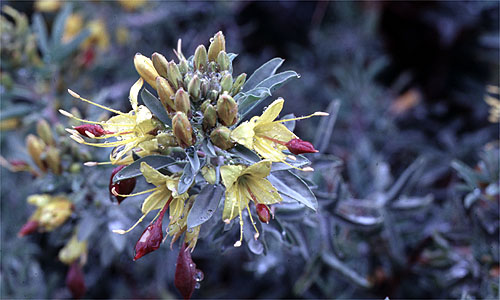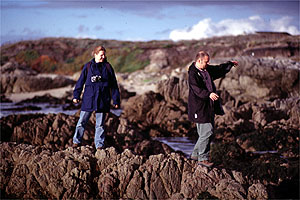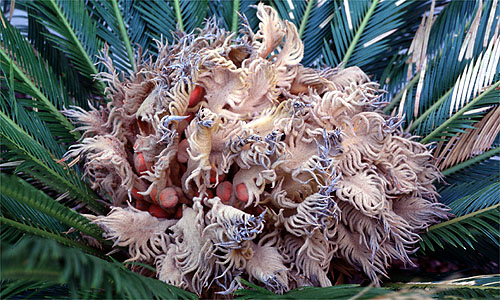|
|
|
|
Plant Biology

The Plant Biology specialization offers advanced training in genetic,
molecular, cellular and organismal approaches toward the study of
plants which are designed to enable graduate students to study important
questions in the signal transduction, cell biology, photosynthesis,
physiology, development, evolution, and host-pathogen interactions
of plants. Many plant biology faculty are using the genetic model
system Arabidopsis thaliana to investigate such intriguing questions
as ethylene signal transduction (Chang), flower development (Liu),
host-pathogen interactions (Hutcheson), membrane transport (Sze),
and genetic transformation (Bottino). Several faculty are actively
studying the plant-pathogen interactions of viruses (Culver, Simon),
bacteria (Hutcheson), and fungi (Bean, Straney). Other faculty are
using contemporary approaches in cell biology to study photosynthesis
(Gantt), cell division and sperm formation (Wolniak), and membrane
transport (Sze). The faculty in plant developmental biology are
doing advanced research on such problems as hormone signal transduction
(Chang), molecular genetics of flower development (Liu), and developmental
mechanisms (Cooke). Finally, both molecular and morphological techniques
are being utilized to address significant evolutionary questions
in bacteria, green algae, and other protists (Delwiche) and land
plants (Cooke). (All students interested in plant ecology are encouraged
to examine the graduate program in the
Department
of Biology). For a more detailed description of faculty research
interests, please click on the faculty links listed below.
The requirements for both M. S. and Ph. D. students in the Plant
Biology specialization are intended to ensure that the students
receive a broad background in cell biology and molecular genetics,
plus advanced training in a particular research area of plant biology.
 Our primary aim is that the students will develop not just technical
research expertise but also the critical thinking skills necessary
for a rewarding career as an independent scientist. All M.S. and
Ph.D. students in Plant Biology follow the first-year program, including
core courses, lab rotations, and seminars, for all entering CBMG
graduate students. Then an advisory committee in consultation with
the research advisor helps each student to choosethe advanced courses
in plant biology and other disciplines that are appropriate for
the student's research plans and career objectives. In addition
to formal courses, the program provides opportunities for critical
discussion of the scientific literature through seminar courses
and journal clubs.
Our primary aim is that the students will develop not just technical
research expertise but also the critical thinking skills necessary
for a rewarding career as an independent scientist. All M.S. and
Ph.D. students in Plant Biology follow the first-year program, including
core courses, lab rotations, and seminars, for all entering CBMG
graduate students. Then an advisory committee in consultation with
the research advisor helps each student to choosethe advanced courses
in plant biology and other disciplines that are appropriate for
the student's research plans and career objectives. In addition
to formal courses, the program provides opportunities for critical
discussion of the scientific literature through seminar courses
and journal clubs.
Recent Ph.D. graduates in Plant Biology have readily obtained as
postdoctoral researchers, faculty members, and independent scientists
in universities, biotech companies, and government agencies. For
further information on career opportunities in plant biology, refer
to the
Botanical Society of America's
webpage booklet entitled "Careers in Botany" . The Botanical Society
webpage includes other links to
career
information sites.
 BSCI 411 Plant Genetics and Molecular Biology (3) - Straney
BSCI 411 Plant Genetics and Molecular Biology (3) - Straney
BSCI 415 Plant Biotechnology (2) - Staff
BSCI 420 Cell Biology (4) - Wolniak
BSCI 427 Principles of Microscopy (2) - Wolniak
BSCI428S Bioinformatics in Genomics and Evolution (3) - Delwiche
BSCI 435 Plant Biochemistry (3) - Sze
BSCI 442 Plant Physiology (4) - Sze
BSCI 490 Plant Structure (4) - Cooke
BSCI 493 Poisonous and Medicinal Plants (3) - Bean
MICB 688A Research Experiences (3) - Cooke
MICB 688G Genetic Approaches to Cell and Developmental Biology (2) - Liu
MICB 688K Photosynthetic Life (3) - Delwiche
PBIO 698 Seminar in Plant Biology - Staff
PBIO 699 Special Problems in Plant Biology (1-3) - Staff
PBIO699K Molecular Systematics (3) - Delwiche
PBIO 699P Mycotoxicology (3) - Bean
PBIO 705 Molecular Genetics of Plants (3) - Chang
PBIO 710 Plant Membrane Physiology (2) - Sze
PBIO 725 Plant Growth and Development (2) - Cohen/Cooke
PBIO 765 Molecular Mechanisms of Plant Pathogenesis (2) - Hutcheson/Straney
PBIO 780 Plant Virology (2) - Culver
PBIO 799 Masters Thesis Research (1-6) - Staff
PBIO 899 Doctoral Dissertation Research (1-8) - Staff
|
George Bean,
Professor
|
| Ph.D. University of Minnesota, 1963. Plant pathology:
occurrence, development, and control of mycotoxins. |
|
Caren Chang,
Associate
Professor |
| Ph.D. California Institute of Technology, 1988. Plant
molecular biology: signal transduction; hormonal signaling. |
|
Todd Cooke,
Professor
|
| Ph.D. Cornell University, 1979. Plant morphogenesis; developmental
processes in lower vascular plants; evolution of developmental mechanisms.
|
|
James Culver,
Associate Adjunct Professor |
| Ph.D., University of California, Riverside, 1991. Molecular
plant-virus interactions; virion assembly, replication, and long-distance
movement of tobacco mosaic virus. |
|
Charles F. Delwiche,
Associate Professor |
| Ph.D. University of Wisconsin-Madison, 1990. Molecular
systematics, phylogeny, and evolution of chloroplasts. |
|
Elisabeth Gantt,
Professor |
| Ph.D. Northwestern University, 1958. Cell biology: photosynthetic
apparatus and accessory pigments; physiology of algae; phylogenetic relationships.
|
|
Steven W.
Hutcheson,
Professor |
| Ph.D. University of California, Berkeley, 1982. Molecular
plant pathology; molecular biology of Pseudomonas parasitism; role and regulation
of Type III protein secretion systems; pathogenicity and non host plant
resistance. |
|
June Kwak, Assistant Professor |
| Ph.D. Pohang University of Science and Technology, 1997. Guard cell ABA
and Ca2+ signal transduction/Single cell-type functional genomics. |
|
Zhongchi Liu,
Associate
Professor |
| Ph.D. Harvard University, 1990. Molecular genetics of
flower development in Arabidopsis. |
|
Stephen Mount,
Associate Professor |
| Ph.D. Yale University, 1983. Pre-mRNA splicing. |
|
Anne Simon,
Professor |
| Ph.D., Indiana University, 1983. Molecular biology of plant-virus
interactions. |
|
David Straney,
Associate Professor |
| Ph.D. Yale University, 1987. Fungal molecular biology:
molecular biology fungal pathogenicity on plants; mechanisms of gene regulation.
|
|
Heven Sze,
Professor
|
| Ph.D. Purdue University, 1975. Biochemistry and physiology: membrane
structure, function, and biogenesis; mechanism and regulation of solute
transport; bioenergetics; proton-and calcium-pumping ATPases. |
|
Stephen Wolniak,
Professor |
| Ph.D. University of
California, Berkeley, 1979. Cell biology:
cell motility; mechanisms of chromosome movement during mitosis; signal
transduction in the regulation of mitotic progression. |
|